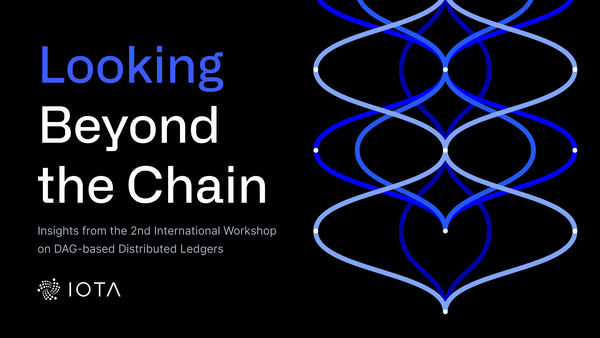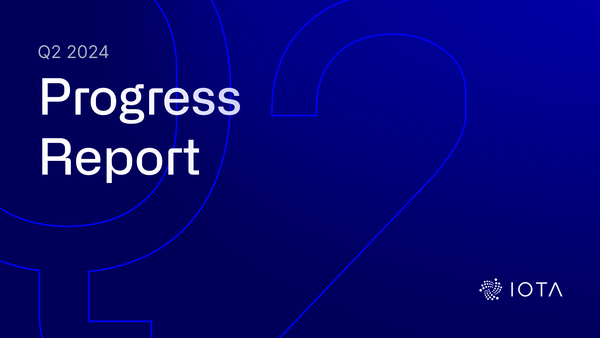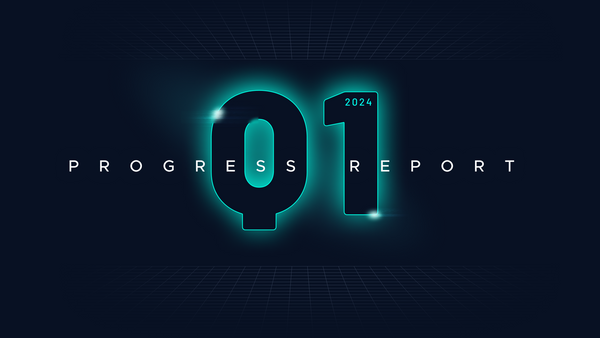Dev Status Update - March, 2021
Published by the IOTA dev team every month, this update will provide you with news and updates about our key projects! Please click here if you want to see the last status update.
The research department is also releasing a monthly update that you might want to read.
Chrysalis
Chrysalis is the mainnet’s intermediate stage before Coordicide is complete. You can read more about the strategy for releasing Chrysalis here.
The Chrysalis phase 1 components were deployed to mainnet in August. The engineering team is now working on Chrysalis phase 2.
Implementing Chrysalis phase 2
The Chrysalis testnet has been live since December. Since then, we have been finalizing the different client library and node implementations. These have been mostly finalized now, with all the APIs locked. This allows partners and exchanges to work on their integrations without breaking changes. Most of the teams are currently busy with final integration touches, or with further testing and internally auditing the final implementations software, such as the client libraries. We are also finalizing the network migration mechanisms - the migration process being something we have been testing for the past couple weeks.
We are also working on Chrysalis documentation, which is still evolving.
We have also been testing an internal build of Firefly and getting it ready for testing outside of IF as well. You can find more information on Firefly below.
Pollen
The team has just released an important upgrade of the Pollen testnet, v0.5.0. This is the first release that includes Mana implementation. The aim of this release is to start assessing Mana before wiring it up into core modules, such as congestion control, Fast Probabilistic Consensus (FPC), distributed Random Number Generator (dRNG), and autopeering.
You can read more about Pollen, Nectar, and Honey, concepts we introduced to talk about the milestones on the path to Coordicide, in this post.
You can follow the project on its GitHub repository. If you want to get involved, check out our updated contributing guidelines.
Bee
The Bee team has released the first alpha of the Rust based node for the Chrysalis network. For those interested, see the instructions on how you can run your Bee node.
The dashboard has been updated with authentication and the node has been prepared for the Chrysalis migration.
For the rest of the Chrysalis functionality, the team is currently working on the local snapshots and MQTT support. The initial audit of the Bee crates has also finished.
The team has also published new live coding sessions.
Hornet
The Hornet team has been largely occupied with preparing and implementing the migration support for Chrysalis phase 2. At the same time, some last changes have been made in the Chrysalis phase 2 implementation of the node software.
The team has also been adding a gossip-on-solidification mechanism, further hardening the node software's defense against flooding attacks.
Smart contracts
The team has released the first major version of smart contracts enabling our ecosystem to start to build. The release contains the integration of a multi-chain environment, secured by the Tangle, the “Layer 1”: Subnetworks, composed of Wasp nodes we call “committees”. These committees can run many blockchains in parallel on top of it without losing perspective of the environments that secures IOTA digital assets, the Tangle. Each such chain, being a functional equivalent of one Ethereum blockchain, is capable of hosting many separate smart contracts.
Make sure you check the release post for more information.
You can follow the updates in the #smartcontracts-discussion and #smartcontracts-dev channels on Discord.
Stronghold
The custom memory allocator with guards and canaries has been completed for all desktop platforms - being entirely rewritten using the amazing libsodium-sys, which now gives us a well-reviewed and best-practice system for protecting IOTA seeds and other private keys when in memory and being actively used. The firewall for our communication actor is under review, and we have verified that calling remote procedures via libp2p works as expected and is as secure as possible.
After the internal IOTA Engineering Department’s review of the entire library, we will be publishing the Beta release of Stronghold Client, Engine and Runtime.
Wallet
Firefly entered a private alpha testing group last Monday. Despite the “alpha” tag, the app is in a very good state and we are diligently fixing any bugs reported by the testing group. The vast majority of functionality is integrated already, and we are currently implementing the Chrysalis migration flow in parallel.
We will follow an expansionist release schedule with regular new builds addressing any found issues. You will hear very soon about how and when you will be able to test Firefly.
IOTA Identity
The Identity team released version 0.2 introducing the credential revocation mechanism, improved scalability and a new WASM package.
We have since started working towards a 0.3 version that runs on the Chrysalis Phase 2 network and makes use of the Stronghold project. Lastly, it will heavily improve the developer experience by introducing an stateful account implementation that automates some of the more IOTA and Identity related functions that are more difficult to learn.
IOTA Streams
Together with Dell Technologies, the team has released an update on the demonstration of project Alvarium, a Data Confidence Fabric re-engineered using IOTA Streams last month. The team has to a large extent finished the Chrysalis phase 2 implementation, with WebAssembly outstanding.
IOTA Experience Team
This month was filled with action for the IOTA Experience Team members.
The IOTA community, driven Simplify X-Team, kicked off and in case you missed it, the meeting recording is available here on YouTube. In addition to that the Simplify X-Team already held their first alignment meeting.
The IOTA Smart Contracts X-Team, led by Evaldas Drąsutis, ISCP (IOTA Smart Contract Protocol) lead at the IOTA Foundation, kicked off with their meeting, catch up here on Youtube.
The other 100% community-driven IOTA Identity X-Team is going strong with weekly meetings every Monday at 8pm CET, if you are interested in building digital identity solutions based on IOTA make sure to join the Experience Team and the meetings.
Last but not least for this month’s update, members of the X-Teams were invited to join a closed alpha test of Firefly, the new IOTA wallet, thanks to the trust relationship between the IOTA Foundation and the X-Team members.
We welcome the latest members to the IOTA X-Teams:
kingofthemountain#4996, gzuma#3012, PIOTA#5143, nikoulai#3471, Nico#2240, aantunovic#7537, Alexander L#7208, InsaneBro#2045, DigitalSoul#7472, Kalila#3937, Vespabro#8592, Rhac#8549, egmcelroy#5568, MajidAkhtar273#7182, tukul#4212, avlo#7357, deniskov7#5059, okOkai#6849, adamski#0458, IOTANaut#6320, Rafael Brochado#6340 and iamadam#2178.
Everyone is invited to the IOTA Experience Teams to pave the road for IOTA to have the best experience in the DLT and IoT space. Read more about the IOTA Experience team in this blog post, discover the IOTA Experience Team on GitHub, explore the IOTA Experience Initiatives and then apply through this form.
Watch the previous X-Team meetings here on the IOTA Foundation YouTube channel.
As always, we welcome everyone to stop by on Discord — every project mentioned here has a channel (or more) for discussion with the devs! Follow us on Twitter to keep track of all the latest news.




